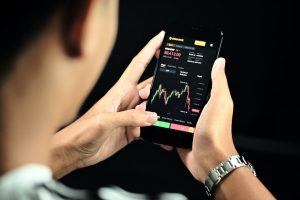Factors Affecting the AUD/USD Exchange Rate: An Analysis
The AUD/USD exchange rate is a widely followed currency pair in the forex market. It represents the value of the Australian dollar against the US dollar. Traders and investors closely monitor this currency pair due to its liquidity and potential for profit. In this article, we will explore the various factors that influence the AUD/USD exchange rate.
1. Interest Rates:
One of the most crucial factors affecting the AUD/USD exchange rate is the interest rate differential between Australia and the United States. Higher interest rates in Australia compared to the US tend to attract foreign investors seeking higher returns on their investments. This increased demand for the Australian dollar strengthens its value, leading to an appreciation in the AUD/USD exchange rate. Conversely, lower interest rates in Australia relative to the US can weaken the Australian dollar, resulting in a depreciation of the exchange rate.
2. Economic Performance:
The economic performance of both Australia and the United States plays a significant role in determining the AUD/USD exchange rate. Strong economic growth, low unemployment rates, and rising consumer confidence in Australia can boost the demand for the Australian dollar. This increased demand will likely lead to an appreciation of the AUD/USD exchange rate. On the other hand, economic downturns, high unemployment rates, or weak consumer sentiment in Australia can weaken the Australian dollar and result in a depreciation of the exchange rate.
Similarly, economic indicators in the United States, such as GDP growth, employment data, and inflation figures, can impact the AUD/USD exchange rate. Positive economic data in the US can strengthen the US dollar and cause the AUD/USD exchange rate to depreciate. Conversely, weaker economic data in the US can lead to a depreciation of the US dollar, resulting in an appreciation of the AUD/USD exchange rate.
3. Commodity Prices:
Australia is a major exporter of commodities such as iron ore, coal, and gold. Therefore, commodity prices, particularly those of Australia’s key exports, have a significant impact on the AUD/USD exchange rate. When commodity prices are high, Australia’s export revenues increase, leading to a stronger demand for the Australian dollar. Consequently, the AUD/USD exchange rate tends to appreciate. Conversely, falling commodity prices can weaken the Australian dollar and result in a depreciation of the exchange rate.
4. Geopolitical Factors:
Geopolitical events and uncertainties can also influence the AUD/USD exchange rate. Political stability and positive international relations tend to attract foreign investment and strengthen the Australian dollar. On the contrary, geopolitical tensions, trade disputes, or political instability can weaken the Australian dollar and result in a depreciation of the exchange rate. Therefore, it is crucial for traders and investors to stay informed about global events that may impact the AUD/USD exchange rate.
5. Risk Sentiment:
The AUD/USD exchange rate is also influenced by global risk sentiment. The Australian dollar is considered a higher-yielding currency, often referred to as a risk-on currency. During periods of global economic stability and positive market sentiment, investors may seek higher returns by investing in riskier assets, including the Australian dollar. This increased demand can lead to an appreciation of the AUD/USD exchange rate. Conversely, during times of market uncertainty or risk aversion, investors tend to move away from higher-yielding assets, resulting in a depreciation of the Australian dollar and a weaker AUD/USD exchange rate.
In conclusion, several factors affect the AUD/USD exchange rate. Interest rates, economic performance, commodity prices, geopolitical factors, and risk sentiment all play significant roles in determining the value of the Australian dollar against the US dollar. As with any currency pair, it is essential for traders and investors to closely monitor these factors to make informed decisions in the forex market.






